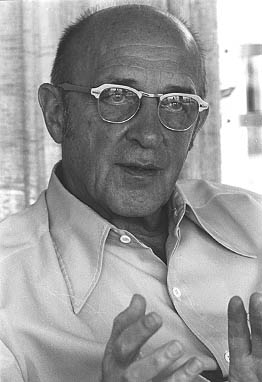Carl R. Rogers (1902-1987)
youtube: Carl Rogers Empathie, Akzeptanz, Kongruenz - Carl Rogers On Person-Centered Therapy
|
|
"We in the West seem to have made a fetish out of complete individual self-sufficiency, of not needing help, of being completely private except in a very few selected relationships."Carl R. Rogers(A way of being, Boston, 1980) |
Citation: Carl Rogers (1902–1987) is the most influential psychologist in American history. His contributions are outstanding in the fields of education, counseling, psychotherapy, peace, and conflict resolution. A founder of humanistic psychology, he has profoundly influenced the world through his empathic presence, his rigorous research, his authorship of sixteen books and more than 200 professional articles. His best known books are: On Becoming a Person, Client Centered Therapy, Freedom to Learn, A way of Being, Carl Rogers on Personal Power, and Becoming Partners: Marriage and Its Alternatives. Two of his books have been published posthumously: The Carl Rogers’ Reader, a collection of his most influential writings, and Carl Rogers’ Dialogues, which features interchanges with such other giants in the field as Paul Tillich, B.F. Skinner, Gregory Bateson, and Rollo May.
His lifetime of research and experiential work focused on demonstrating the psychological conditions for allowing open communication and empowering individuals to achieve their full potential. He pioneered the move away from traditional psychoanalysis, and developed client-centered psychotherapy, which recognizes that “each client has within him or herself the vast resources for self-understanding, for altering his or her self-concept, attitudes, and self-directed behavior—and that these resources can be tapped by providing a definable climate of facilitative attitudes.”
Carl Rogers’ last decade was devoted to applying his theories in areas of national social conflict, and he traveled worldwide to accomplish this. In Belfast, Ireland, he brought together influential Protestants and Catholics; in South Africa, blacks and whites, in the United States, consumers and providers in the health field. His last trip, at age 85, was to the Soviet Union, where he lectured and facilitated intensive experiential workshops fostering communication and creativity. He was astonished at the numbers of Russians who knew of his work.
Recognition of his work has come through dozens of honorary awards and degrees bestowed on him from around the world, among them the American Psychology Association’s Distinguished Scientific Contribution Award the first year it was given. A few years later he also received the American Psychology Association’s Distinguished Professional Contribution Award.
Carl Rogers was a model for compassion and democratic ideals in his own life, and in his work as an educator, writer, and therapist.
Natalie Rogers
(Bilder/Textelemente: Wikipedia en de nl - Biography - Natalie Rogers' Site)

